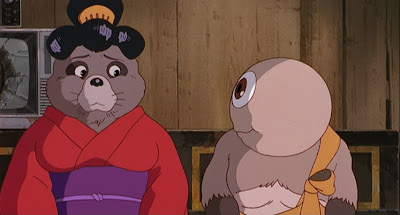Let's be honest here: Pom Poko is one of the weirder selections in the Studio Ghibli portfolio. It doesn't get nearly as much love in Ghibli fan circles as some of their higher profile releases like Spirited Away or Princess Mononoke do, but there's a lot about this less celebrated film worth recommending. The action centers around a group of raccoons (okay, anime nerds, tanuki) whose natural living space is being infringed upon by ongoing human settlements. So, basically, we've got an environmentally-themed kid's movie about urban sprawl.
Doesn't sound very strange to you? What if I told you that these particular raccoons are shape-shifters, able to take on any form that they wish? Furthermore, the male raccoons use their distinctly masculine, um, "pouch" in a likewise magical manner, inflating it at will or having it appear as a rug, etc. One would be hard-pressed to point out an example of an animated product from the West containing such frank, anatomical depictions. In Pom Poko, there's little hoopla associated with the choice to portray the characters this way; they're male, so, of course, they're packin' heat. The movie doesn't get bogged down by this, so we won't either...
The far more interesting thing about Pom Poko is how it handles the raccoon population's attempts to address their shared problem. They start in a fairly common place, trading violence for the violence being wrought against them and their homes. Soon enough, though, the group becomes divided in opinion about how to proceed, many feeling uncomfortable about the dire consequences that their actions have had on individual humans. In a sense, what director Isao Takahata's story is showing us is the birth of a politically-charged, activist movement, one that just happens to be made up of raccoons.
It's interesting to see such adult concepts as group process and consensus being tested out in a children's entertainment, but maybe that says more about the utterly banal films being released for kids by Hollywood nowadays. If anything, Pom Poko respects the intelligence of children; sure, it's plenty silly at times, offering up more than one raccoon party involving folk songs about roadkill, but there's also more than a few losses stacked up by the end of the film, making the resolution of the film nothing if not bittersweet.
Pom Poko is an odd duck of a film, no doubt. Though, if you've somehow neglected seeing it, this final week of the NW Film Center's Studio Ghibli retrospective offers the perfect opportunity to correct the mistakes of the past. As well as a chance to ponder the fate of raccoons, I suppose.
Pom Poko screens as a part of the retrospective series, Castles in the Sky: Miyazaki, Takahata, and the Masters of Studio Ghibli. More info about the Studio Ghibli series here.
It plays at the NW Film Center's Whitsell Auditorium (in the Portland Art Museum) on Friday, May 25th at 7pm and Sunday, May 27th at 2pm.
Remember to find and "like" us on our Facebook page.
Subscribe to the blog's feed here.









